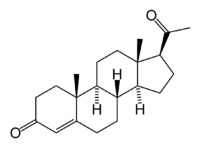Using Bioidentical Progesterone to Stop Miscarriage and Premature Delivery
Fertility Medical Doctors routinely use bioidentical natural progesterone to prevent miscarriage. They are the "test tube" doctors. They routinely use progesterone to maintain the pregnancy. If the pregnant woman does not have enough the natural hormone, then the woman will have a miscarriage. So the Fertility Medical Doctor will give periodic shots of the natural hormone. Progesterone may also be taken orally, vaginally or topically as well. However, it is important to remember that anything taken topically is 10 times in potency than anything taken orally. This is because anything taken orally is 90% prefiltered by the liver. This means that a 20 mg/day topical dose of the natural hormone is equivalent to a 200 mg/day oral dose. The natural hormone taken vaginally or rectally is also 10 times less in potency than a topical dose. The rectal and vaginal area is drained by the portal vein. The portal vein goes straight to the liver, and inactivates 90% of the progesterone.
So to avoid a first trimester miscarriage, you just need to take 60 mg/day of topical progesterone for a 120lb woman. This is equivalent to 600 mg/day of oral progesterone. You should be under the direct care of a physician or health care provider to do this. The topical natural hormone goes up and down in the human body in about 7 hours. Thus, it is best to break up the use of the natural hormone into two doses 30 mg topically in the morning and 30 mg in the evening.
Several times I have stopped a miscarriage that was happening by using 200 mg/day topically. The woman was having contractions, and bleeding and these babies came out fine and healthy. There is no danger of going up suddenly on the the natural hormone dose. The danger is coming down on the natural hormone dose suddenly. If you forget to take the natural hormone for one day, your progesterone levels will drop and this will cause a miscarriage. You cannot run out of the natural hormone. You cannot forget to take your natural hormone dose daily. This is critical.
In most cases, but not all cases, natural progesterone supplementation is only needed during the first trimester. After 16 weeks or so, the the topical natural hormone dose may be SLOWLY tapered off 10 mg less every day. You maintain at 60 mg/day up to 16 weeks, then during week 17 you can do 50 mg/day. Week 18, you may do 40 mg/day. This is because the corpus luteum produces the natural hormone during the first trimester. During the second and third trimesters, the placenta produces the natural hormone in greater quantities. Normally, supplemental progesterone is not needed. However, some patients need the natural hormone throughout the entire pregnancy.
See a video about the synthesis of progesterone in the lab. This PBS Nova special about Julian Percy, PhD. an outstanding chemist that led the research to be able to synthesize the natural hormone cheaply and in quantity for the mass market.

Here is one case. This woman was extremely allergic with a hypersensitivity to smell. She also had Hashimoto's Thyroiditis. I used a the natural hormone dissolved in coconut oil. She had 2 previous miscarriages at week 5. I started the natural hormone on her right after conception. Right at 5-6 weeks she developed a rash to the progesterone in coconut oil. I switched her to the natural hormone in grapeseed oil and the natural hormone in olive oil. I had her alternate olive oil one week and grapeseed oil the next to prevent a repeat creation of the allergy. I continued the the natural hormone supplementation throughout the entire pregnancy because she likely had progesterone antibodies. The normal gestation time is 40 weeks. Unknown to me, her health care provider advised her to stop the progesterone at 38 weeks. I personally, do not think that this was a good idea. She stopped the the natural hormone and 48 hours later she delivered. Dropping the natural hormone levels instructed the placenta to begin to separate off the side of the uterus. This is not a good idea. I would have advised to continue taking the natural hormone until other hormones kicked in and started the delivery. The baby is well and healthy and intelligent.
Less than 1 % of all patients do not absorb the natural hormone well topically. They may need either another topical preparation or they can take oral progesterone. No one that I have talked to seems to know why these patients do not absorb a particular the topical natural hormone well. But you must make sure that you are absorbing the natural hormone well through the skin if you are using for miscarriage prevention.
You must be very careful about which the topical natural hormone cream you use. Perhaps 60-70% of all the natural hormone creams have some kind of herb or chemical that is estrogen stimulating or progesterone blocking. For instance, parabens and phenoxyethanol are estrogen mimicking. This cannot be good. Even natural herbs can have profound effects on the pregnancy. Aloe a common additive to the natural hormone creams is a progesterone blocker. Aloe was used by the ancients to create a miscarriage in the first trimester. If you take sufficient aloe during the first trimester, you can induce a miscarriage. Many times when patients complain that the natural hormone cream does not work, they may be taking large amounts of aloe.
There are many herbs that have profound effects on the hormone system. There are roughly 300 breast enlargement formulas in the folk medicines of Europe. 200 of the 300 breast enlargement formulations are topical.
There is no danger of taking progesterone througout the entire pregnancy. The danger is that if you forget one day you will generate a miscarriage. You cannot forget to take the natural hormone every day.
You can even use bioidentical progesterone to prevent an early delivery.
Here is an article that describes some research using progesterone to prevent premature delivery:
By PAUL ELIAS, AP Biotechnology Writer
A North Carolina doctor presented results Thursday of a groundbreaking study that showed the hormone progesterone prevented premature births in a surprisingly high number of high-risk pregnancies.
"The evidence of this treatment's effectiveness was so dramatic, the research was stopped early," said the study's lead researcher, Dr. Paul Meis of Wake Forest University Baptist Medical Center.
Progesterone is naturally produced by the ovaries. It softens the uterus lining into a spongy bed that holds a fertilized egg.
Weekly injections of the hormone reduced the chance of premature births by 34 percent in the 306 high-risk women who received the therapy, the study reported. An additional 153 women were injected with a placebo. All the women had previously given birth prematurely, the single biggest indication of risk.
The study was carried out at the 19 centers that comprise the Maternal Fetal Medicine Units Network under the National Institutes of Health (news - web sites). Meis unveiled the results in San Francisco at the annual meeting of the Society for Maternal-Fetal Medicine.
"The results are so good that it's surprising," said Dr. Fredric Frigoletto, chief of obstetrics at Massachusetts General Hospital in Boston. "No intervention that we have ever applied has had any measurable effect. This is very good news."
Doctors have prescribed the natural hormone for years to help infertile and menopausal women.
Meis said progesterone had been previously toyed with as a preventive treatment for premature births in the 1960s and 1970s, but no one has completed a serious study on the subject.
"I think it's going to awaken people to an old idea that kind of slipped away," said Dr. Alan DeCherney, chair of the Obstetrics and Gynecology department at the University of California, Los Angeles.
Dr. Emile Papiernik, a French obstetrician, conducted a tiny progesterone study in 1970 that showed promise. But he said he couldn't interest any pharmaceutical companies or government agencies to fund a more comprehensive experiment.
"This has been sitting on the pharmacist's shelf for more than 30 years," Papiernik said.
In 2001, about 476,000 babies were born too soon in the United States � a 27 percent increase since 1981, according to the March of Dimes. One in eight babies was born before the 37th week of pregnancy, which is considered full term.
"The problem is huge," said Dr. Nancy S. Green, a New York City pediatrician and medical director of the March of Dimes. Last week she announced the organization's $75 million, five-year program to reduce premature births.
Babies born prematurely are at increased risk for neurological, hearing and behavioral problems. The average hospital charge in 2000 for a premature baby was $58,000, compared with $4,300 for a typical newborn, according to the March of Dimes.
Some of the increase in premature births can be attributed to more older women giving birth and the explosion of obesity in the country, Green said. But fully half of premature births have no known cause, Green said.
The March of Dimes said black women give birth prematurely at disproportionately high rates: 17.5 percent of all births to black women last year were premature, compared with the national average of 11.9 percent.
Frigoletto said that high rate has been studied extensively � but no definitive, scientific conclusions have been drawn.
In Meis' study, 59 percent of the women were black. The researchers concluded that race didn't influence the hormone's effectiveness.
"I think it really will attract a lot of interest," Meis said of the study. "This is the first fairly effective treatment for pre-term births."
Fertility Medical Doctors routinely use bioidentical natural progesterone to prevent miscarriage. They are the "test tube" doctors. They routinely use progesterone to maintain the pregnancy. If the pregnant woman does not have enough the natural hormone, then the woman will have a miscarriage. So the Fertility Medical Doctor will give periodic shots of the natural hormone. Progesterone may also be taken orally, vaginally or topically as well. However, it is important to remember that anything taken topically is 10 times in potency than anything taken orally. This is because anything taken orally is 90% prefiltered by the liver. This means that a 20 mg/day topical dose of the natural hormone is equivalent to a 200 mg/day oral dose. The natural hormone taken vaginally or rectally is also 10 times less in potency than a topical dose. The rectal and vaginal area is drained by the portal vein. The portal vein goes straight to the liver, and inactivates 90% of the progesterone.

Progesterone during the first trimester to prevent miscarriage
15% of recognized pregnancies end in miscarriage. 80% of these miscarriages end in the first trimester. A first trimester miscarriage at 5-8 weeks can usually be avoided by using progesterone. The natural hormone is made by the corpus luteum during the first trimester at about 60 mg/day in the very beginning. The natural hormone ramps up higher and higher so that at its peak during one day of third trimester pregnacy your body is making 400 mg/day. During the second and third trimester, the placenta makes most of the the natural hormone.So to avoid a first trimester miscarriage, you just need to take 60 mg/day of topical progesterone for a 120lb woman. This is equivalent to 600 mg/day of oral progesterone. You should be under the direct care of a physician or health care provider to do this. The topical natural hormone goes up and down in the human body in about 7 hours. Thus, it is best to break up the use of the natural hormone into two doses 30 mg topically in the morning and 30 mg in the evening.
Several times I have stopped a miscarriage that was happening by using 200 mg/day topically. The woman was having contractions, and bleeding and these babies came out fine and healthy. There is no danger of going up suddenly on the the natural hormone dose. The danger is coming down on the natural hormone dose suddenly. If you forget to take the natural hormone for one day, your progesterone levels will drop and this will cause a miscarriage. You cannot run out of the natural hormone. You cannot forget to take your natural hormone dose daily. This is critical.
In most cases, but not all cases, natural progesterone supplementation is only needed during the first trimester. After 16 weeks or so, the the topical natural hormone dose may be SLOWLY tapered off 10 mg less every day. You maintain at 60 mg/day up to 16 weeks, then during week 17 you can do 50 mg/day. Week 18, you may do 40 mg/day. This is because the corpus luteum produces the natural hormone during the first trimester. During the second and third trimesters, the placenta produces the natural hormone in greater quantities. Normally, supplemental progesterone is not needed. However, some patients need the natural hormone throughout the entire pregnancy.
See a video about the synthesis of progesterone in the lab. This PBS Nova special about Julian Percy, PhD. an outstanding chemist that led the research to be able to synthesize the natural hormone cheaply and in quantity for the mass market.
Progesterone during the Entire Pregnancy prevents miscarriage
I have seen 3 patients out of about 30 patients that needed the natural hormone throughout the entire pregnancy. These patients may have developed antibodies against progesterone itself. Beer, MD has documented women with progesterone antibodies. Most of these women that have antibodies against the natural hormone are extremely allergic women with high stress/fear/anxiety. They may have Hasimoto's Thyroiditis. I did have one woman that was NOT extremely allergic that needed the natural hormone throughout the entire pregnancy. If you have Hashimoto's Thyroiditis and have trouble with miscarriage, I would have the woman take progesterone throughout the entire pregnancy.
Here is one case. This woman was extremely allergic with a hypersensitivity to smell. She also had Hashimoto's Thyroiditis. I used a the natural hormone dissolved in coconut oil. She had 2 previous miscarriages at week 5. I started the natural hormone on her right after conception. Right at 5-6 weeks she developed a rash to the progesterone in coconut oil. I switched her to the natural hormone in grapeseed oil and the natural hormone in olive oil. I had her alternate olive oil one week and grapeseed oil the next to prevent a repeat creation of the allergy. I continued the the natural hormone supplementation throughout the entire pregnancy because she likely had progesterone antibodies. The normal gestation time is 40 weeks. Unknown to me, her health care provider advised her to stop the progesterone at 38 weeks. I personally, do not think that this was a good idea. She stopped the the natural hormone and 48 hours later she delivered. Dropping the natural hormone levels instructed the placenta to begin to separate off the side of the uterus. This is not a good idea. I would have advised to continue taking the natural hormone until other hormones kicked in and started the delivery. The baby is well and healthy and intelligent.
Less than 1 % of all patients do not absorb the natural hormone well topically. They may need either another topical preparation or they can take oral progesterone. No one that I have talked to seems to know why these patients do not absorb a particular the topical natural hormone well. But you must make sure that you are absorbing the natural hormone well through the skin if you are using for miscarriage prevention.
You must be very careful about which the topical natural hormone cream you use. Perhaps 60-70% of all the natural hormone creams have some kind of herb or chemical that is estrogen stimulating or progesterone blocking. For instance, parabens and phenoxyethanol are estrogen mimicking. This cannot be good. Even natural herbs can have profound effects on the pregnancy. Aloe a common additive to the natural hormone creams is a progesterone blocker. Aloe was used by the ancients to create a miscarriage in the first trimester. If you take sufficient aloe during the first trimester, you can induce a miscarriage. Many times when patients complain that the natural hormone cream does not work, they may be taking large amounts of aloe.
There are many herbs that have profound effects on the hormone system. There are roughly 300 breast enlargement formulas in the folk medicines of Europe. 200 of the 300 breast enlargement formulations are topical.

There is no danger of taking progesterone througout the entire pregnancy. The danger is that if you forget one day you will generate a miscarriage. You cannot forget to take the natural hormone every day.
You can even use bioidentical progesterone to prevent an early delivery.
Here is an article that describes some research using progesterone to prevent premature delivery:
Progesterone May Reduce Premature Births
Feb 6, 2003By PAUL ELIAS, AP Biotechnology Writer
A North Carolina doctor presented results Thursday of a groundbreaking study that showed the hormone progesterone prevented premature births in a surprisingly high number of high-risk pregnancies.
"The evidence of this treatment's effectiveness was so dramatic, the research was stopped early," said the study's lead researcher, Dr. Paul Meis of Wake Forest University Baptist Medical Center.
Progesterone is naturally produced by the ovaries. It softens the uterus lining into a spongy bed that holds a fertilized egg.
Weekly injections of the hormone reduced the chance of premature births by 34 percent in the 306 high-risk women who received the therapy, the study reported. An additional 153 women were injected with a placebo. All the women had previously given birth prematurely, the single biggest indication of risk.
The study was carried out at the 19 centers that comprise the Maternal Fetal Medicine Units Network under the National Institutes of Health (news - web sites). Meis unveiled the results in San Francisco at the annual meeting of the Society for Maternal-Fetal Medicine.
"The results are so good that it's surprising," said Dr. Fredric Frigoletto, chief of obstetrics at Massachusetts General Hospital in Boston. "No intervention that we have ever applied has had any measurable effect. This is very good news."
Doctors have prescribed the natural hormone for years to help infertile and menopausal women.
Meis said progesterone had been previously toyed with as a preventive treatment for premature births in the 1960s and 1970s, but no one has completed a serious study on the subject.

"I think it's going to awaken people to an old idea that kind of slipped away," said Dr. Alan DeCherney, chair of the Obstetrics and Gynecology department at the University of California, Los Angeles.
Dr. Emile Papiernik, a French obstetrician, conducted a tiny progesterone study in 1970 that showed promise. But he said he couldn't interest any pharmaceutical companies or government agencies to fund a more comprehensive experiment.
"This has been sitting on the pharmacist's shelf for more than 30 years," Papiernik said.
In 2001, about 476,000 babies were born too soon in the United States � a 27 percent increase since 1981, according to the March of Dimes. One in eight babies was born before the 37th week of pregnancy, which is considered full term.
"The problem is huge," said Dr. Nancy S. Green, a New York City pediatrician and medical director of the March of Dimes. Last week she announced the organization's $75 million, five-year program to reduce premature births.
Babies born prematurely are at increased risk for neurological, hearing and behavioral problems. The average hospital charge in 2000 for a premature baby was $58,000, compared with $4,300 for a typical newborn, according to the March of Dimes.
Some of the increase in premature births can be attributed to more older women giving birth and the explosion of obesity in the country, Green said. But fully half of premature births have no known cause, Green said.
The March of Dimes said black women give birth prematurely at disproportionately high rates: 17.5 percent of all births to black women last year were premature, compared with the national average of 11.9 percent.
Frigoletto said that high rate has been studied extensively � but no definitive, scientific conclusions have been drawn.
In Meis' study, 59 percent of the women were black. The researchers concluded that race didn't influence the hormone's effectiveness.
"I think it really will attract a lot of interest," Meis said of the study. "This is the first fairly effective treatment for pre-term births."
The Big Pharmaceutical Business Model
The reason why natural progesterone is not being investigated further and publisized that that there no money to be made on an unpatented drug. 17 alpha-hydroxyprogesterone caproate, 17P, a patented modification of natural progesterone is currently being tested to prevent premature delivery. Search on the web for 17 alpha-hydroxyprogesterone caproate and miscarriage. Money can be made with this. However, since natural bioidentical progesterone is not patented. No money can be made. There is no interest in testing natural progesterone. |
 |